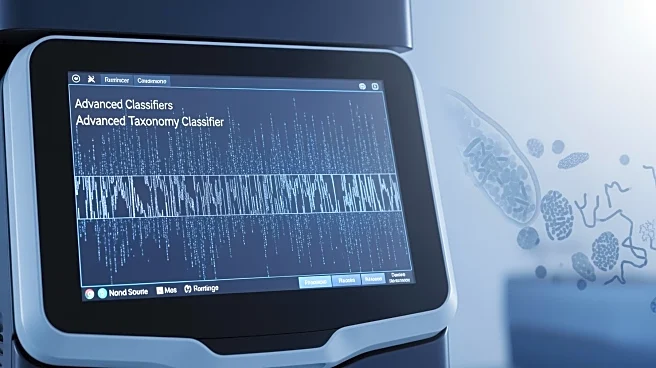What's Happening?
Recent developments in sequencing technologies and taxonomy classifiers have significantly improved the characterization of microbiomes, particularly in non-human environments such as the rumen. The study
highlights the limitations of existing databases, which are predominantly human-centric, affecting the accuracy of rumen microbiome analysis. To address this, researchers have proposed the use of manually weighted taxonomy classifiers (MWTC) that assign weights during the classification process, enhancing the accuracy of microbial identification. The MWTC demonstrated higher classification counts and lower error rates compared to unweighted taxonomy classifiers (UWTC) and average weighted taxonomy classifiers (AWTC), particularly at lower taxonomic levels. This approach preserves the relative abundance of key microbial taxa in rumen samples, offering a more precise classification method for rumen microbiota.
Why It's Important?
The introduction of MWTC in rumen microbiome analysis is crucial for improving the accuracy of microbial identification, which has significant implications for agricultural and environmental research. By providing a more precise classification of rumen microbiota, MWTC can enhance our understanding of the microbial communities that influence ruminant digestion and health. This could lead to better management practices in livestock farming, potentially improving animal health and productivity. Additionally, the improved classification accuracy may contribute to more effective studies on the environmental impact of ruminants, aiding in the development of sustainable agricultural practices.
What's Next?
Further validation of MWTC using datasets from diverse ruminant breeds is necessary to assess its generalizability for breed-specific microbiome analyses. Researchers also plan to test the classifier performance across different hypervariable regions of the 16S rRNA gene to ensure comprehensive validation. The study suggests that integrating MWTC with databases like GTDB could be beneficial for future research, potentially leading to more detailed studies on microbial communities. These steps are essential for refining the MWTC approach and expanding its application in microbiome research.
Beyond the Headlines
The development of MWTC highlights the need for more inclusive microbiome databases that account for non-human environments. This shift could drive advancements in microbiome research beyond human-centric studies, fostering a broader understanding of microbial ecosystems. The ethical implications of such research include the potential for improved animal welfare and environmental sustainability, as more accurate microbiome analyses can inform better agricultural practices.










